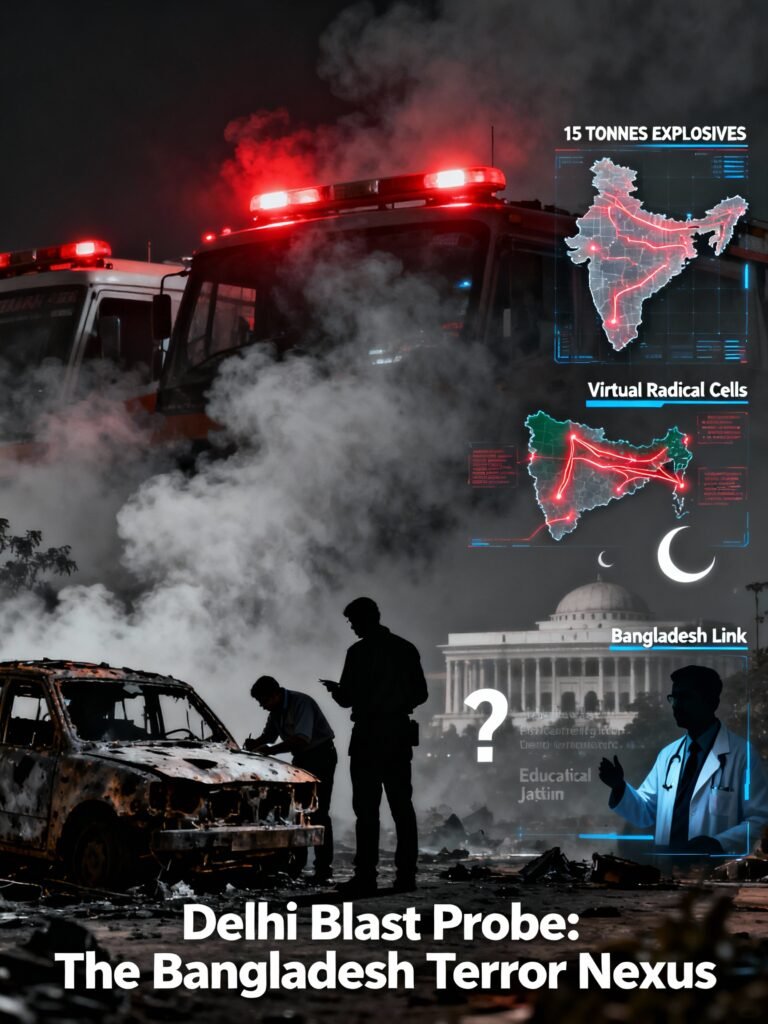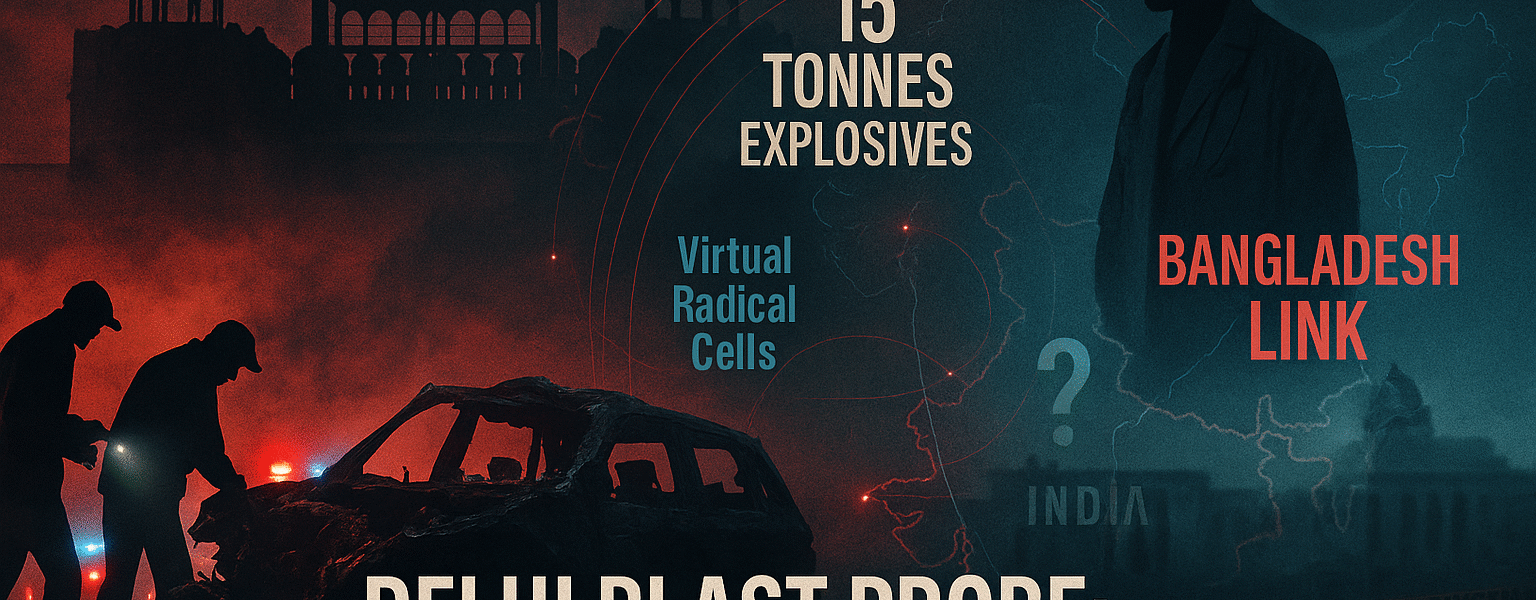Delhi Blast Investigation Explodes into Major Bangladesh Terror Plot — 3-Tonne Explosives Trail, Educated Jihad Network Exposed
What initially appeared to be another tragic explosion in the capital has now spiralled into one of India’s most disturbing terror investigations in years. The recent Delhi blast, which killed and injured dozens near the Red Fort area, has revealed a dangerous and unexpected nexus stretching far beyond India’s borders — reaching deep into Bangladesh, Turkey, and radicalised digital networks run by Islamic extremist groups.
What investigators are now piecing together presents a chilling picture: highly educated Indian professionals — including a group of doctors — were allegedly recruited into a transnational terror conspiracy, coordinated via virtual meetings hosted across the border in Bangladesh. The Delhi blast case marks a dramatic escalation in the sophistication, scale, and geopolitical implications of Islamic radical terrorism in the region.
The Delhi Blast and the First Breakthrough
According to Delhi Police and counter-terror agencies, the explosion was triggered by an improvised device packed with ammonium nitrate and suspected military-grade accelerants. The registered owner of the car — a well-qualified doctor from Delhi with no previous criminal record — became the first major link in a wider chain.
A series of arrests followed in Delhi, Uttar Pradesh, and Gujarat. Shockingly, five Muslim doctors and three clerics were allegedly connected to the wider extremist network. Investigators say these individuals were not fringe radicals but white-collar professionals indoctrinated through online propaganda, encrypted chats, and foreign-hosted radical study circles.
This validated what many experts have warned for years: educated jihad — ideological extremism amplified through academic, social, and digital spaces — is a rising threat in South Asia.
Virtual Meetings Traced to Bangladesh — And a High-Level Shock
While intelligence agencies expected eventual links to Pakistan’s terror infrastructure, the Bangladesh connection in the Delhi blast has sent shockwaves through India’s security establishment.
Sources in the counter-terror grid confirm that:
- Multiple virtual radicalisation meetings were traced back to servers and organisers based in Bangladesh.
- At least two such sessions were allegedly attended or facilitated by an official linked to a Bangladeshi government agency.
- These meetings, held under innocuous titles like “religious study” or “youth awakening”, allegedly shared encrypted literature promoting extremist ideologies and discussed logistical coordination for attacks inside India.
Senior intelligence officials describe this as “one of the gravest regional security breaches involving Bangladesh in recent memory.”
If verified, it poses a direct diplomatic and strategic challenge — especially given that Bangladesh has publicly positioned itself as an ally in counter-terrorism cooperation.
The Explosive Twist: Tonnes of Nitrates Circulated for Mass Casualties

Early estimates suggested around 3 tonnes of ammonium nitrate–based mixtures had been circulated among sleeper networks. But new assessments point to a far more terrifying figure:
Officials say this staggering stockpile had the potential to inflict mass casualties on nearly 50,000 people, depending on placement and dispersion.
This scale indicates:
- Long-term planning,
- Deep operational support, and
- A transnational financing and procurement pipeline.
Investigators are now probing whether elements in Turkey, already known for hosting fringe global Islamist groups, played a role in ideological or logistical support.
Why the Bangladesh Link Matters More Than Pakistan’s
Pakistan-backed terror infiltration is an old and well-documented problem. India’s entire counter-terror ecosystem is structured with this expectation.
But Bangladesh’s emergence in this case is uniquely alarming because:
1. The border is longer, more porous, and socio-economically blended. Millions cross informally for work, family, or smuggling — making radical sleeper networks harder to detect.
2. Bangladesh has not traditionally been seen as an overt terror exporter. The perception of political stability lulled agencies into assuming a lower threat threshold.
3. Alleged involvement of a government-linked individual raises red flags of systemic penetration.
4. Radical Islamic groups inside Bangladesh have grown more assertive, especially after political instability, Islamist street movements, and rising anti-India rhetoric in recent years.
The discovery of the Bangladesh nexus means India may now be forced to prepare for a two-front Islamic radical threat: Pakistan’s known handlers + Bangladesh’s emerging extremist ecosystem.
Turmoil Inside Bangladesh — A Country in Denial or in Danger?
The revelations have triggered turmoil inside Dhaka’s political circles.
Analysts say any confirmation of an official’s role could:
- Trigger a diplomatic crisis,
- Undermine Bangladesh’s global credibility,
- Invite international scrutiny of its governance and intelligence apparatus,
- Strengthen hardline Islamist elements seeking to destabilise Bangladesh itself.
Dhaka has so far denied any official role, but internal cracks are visible as opposition groups exploit the controversy.
What This Means for India — New Counter-Terror Imperatives
Security officials outline several urgent actions India may need to take:
1. Redefine Bangladesh as a high-risk zone for radicalisation intelligence.
2. Tighten border surveillance using AI, drones, and demographic pattern-mapping.
3. Monitor white-collar sectors — especially medical, tech, and academia — for signs of ideological recruitment.
4. Strengthen cyber forensics to break encrypted radicalisation networks.
5. Expand diplomatic pressure on Dhaka for transparency on internal extremist groups.
6. Fast-track counter-extremism cooperation with Southeast Asian nations battling similar threats.
The Bigger Picture — A New Phase of Terrorism in South Asia
The Delhi blast investigation has become far more than a crime probe. It is a preview of a new era of terrorism:
- Highly educated recruits
- Borderless digital radicalisation
- Transnational planners
- State-linked shadows
- Multi-tonne explosive stockpiles
- Cross-border ideological pipelines from Pakistan, Bangladesh, and Turkey
India now faces a stark reality: Islamic radical terror networks are evolving faster than traditional counter-terror frameworks.
The threat is no longer limited to the Line of Control — it is digital, ideological, and deeply embedded across borders.
Conclusion: A Warning India Cannot Ignore
The widening Bangladesh link has forced Indian intelligence to confront a painful truth: the threat landscape has changed permanently. The Delhi blast is not just an isolated attack but a signal of how complex, deceptive, and large-scale Islamic radical networks have become.
As India recalibrates its strategy, one fact is clear — vigilance, cross-border intelligence, and proactive disruption are now national imperatives.
If ignored, the next attack may not just be another blast — it could be a mass-casualty event planned on an industrial scale.
The reader may find credible sources on radicalisation in Bangladesh
International Crisis Group (ICG) — “Countering Jihadist Militancy in Bangladesh”
Carnegie Endowment for International Peace — analyses on Hefazat-e-Islam and radical movements
South Asia Terrorism Portal (SATP) — profiles on JMB, HuJI-B, and Ansar Al Islam
US State Department: Country Reports on Terrorism — Bangladesh section
On educated or white-collar radicalisation
Ajay Sahni, Institute for Conflict Management — extensive commentary on ‘educated extremism’
Rohan Gunaratna, Nanyang Technological University — research on tech-savvy jihad networks
On Turkey-based Islamist networks
Defence for Democracy (FDD) — “Turkey’s role as a permissive environment for extremist organisations”
Middle East Institute (MEI) — “How political Islam networks operate across borders.”
Delhi blast investigation, Bangladesh terror link, educated jihad India, Islamic radicalisation network, 15 tonnes explosives India, Bangladesh official terror meetings, India Bangladesh terror nexus, Delhi terror attack probe, cross-border terrorism South Asia, Turkey Islamic extremist link
Discover more from
Subscribe to get the latest posts sent to your email.











1 COMMENTS